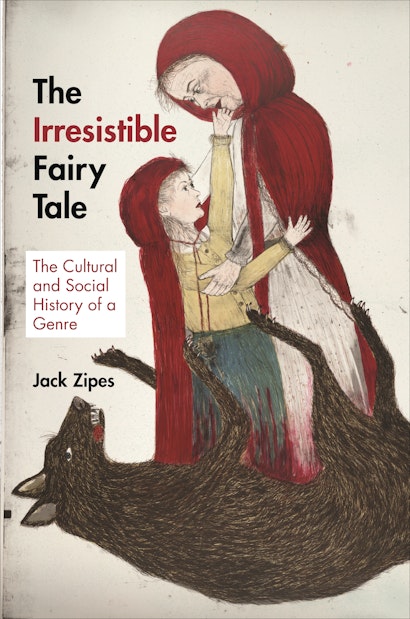If there is one genre that has captured the imagination of people in all walks of life throughout the world, it is the fairy tale. Yet we still have great difficulty understanding how it originated, evolved, and spread—or why so many people cannot resist its appeal, no matter how it changes or what form it takes. In this book, renowned fairy-tale expert Jack Zipes presents a provocative new theory about why fairy tales were created and retold—and why they became such an indelible and infinitely adaptable part of cultures around the world.
Drawing on cognitive science, evolutionary theory, anthropology, psychology, literary theory, and other fields, Zipes presents a nuanced argument about how fairy tales originated in ancient oral cultures, how they evolved through the rise of literary culture and print, and how, in our own time, they continue to change through their adaptation in an ever-growing variety of media. In making his case, Zipes considers a wide range of fascinating examples, including fairy tales told, collected, and written by women in the nineteenth century; Catherine Breillat’s film adaptation of Perrault’s “Bluebeard”; and contemporary fairy-tale drawings, paintings, sculptures, and photographs that critique canonical print versions.
While we may never be able to fully explain fairy tales, The Irresistible Fairy Tale provides a powerful theory of how and why they evolved—and why we still use them to make meaning of our lives.
Awards and Recognition
- Co-Winner of the 2012 Wayland D. Hand Prize, History and Folklore Section of the American Folklore Society
- One of Choice's Outstanding Academic Titles for 2012
"Zipes is a powerful defender of folklore and succeeds in exploring its role in cultural history as well as its influence today."—Maria Taylor, Times Literary Supplement
"Zipes is the undisputed 'king' of the literary criticism of fairy tales kingdom. . . . A rich, persuasive, magical brew, graced by seven illustrations."—Choice
"Zipes is considered one of the true experts on fairy tales. He brings considerable erudition to the book which covers some broad issues in fairy-tale analysis, such as how they spread . . . and the role of women collectors and narrators."—Nidhi Mathur, Organiser
"In showing how and why fairy tales have become a core part of our central being, Zipes reveals his extensive scholarship in the field, as well as his skill in expounding profoundly about his key interests and concerns relating to the fairy tale genre. This scholarly masterpiece, which has emerged from decades of thought on the subject, deserves a place in all literary collections, as well as consideration by all those concerned with this particular genre."—Lois Henderson, Book Pleasures
"Zipes is one of a handful of today's true experts on the fairy tale. Needless to say, he brings considerable erudition to this book, which covers some broad issues in fairy tale analysis such as how they spread (he takes his lead from Richard Dawkins's theory of cultural memes) and the role of women collectors and narrators. . . . General readers with an interest in fairy tales will definitely enjoy what Zipes has to say."—David Azzolina, Library Journal
"From Sumerian fables to Catherine Breillat's cinematic interpretations, fairy tales have traveled far. Professor Jack Zipes follows the evolution of a genre of folklore that serves to discretely communicate knowledge and experience. Reaching beyond our childhood memories of Cinderella and Beauty and the Beast, he explores the characters and tales that have thrived over the centuries, detailing especially French and Russian tales that have endured, albeit sometimes with a change of focus. . . . This is not a book for the beach but the fruits of a study researched over several decades and offered especially to an academic readership. As such, the considerable chapter notes, bibliography, provocative illustrations, and index are all fitting."—Jane Manaster, Sacramento Book Review
"Zipes traces the origin of storytelling back to a primal past. . . . The reason they survive to this day, Zipes suggests, is because the classic fairy tales—such as Snow White, Cinderella, and Rapunzel, which all have analogues in cultures throughout the world—are perfect examples of 'memetic' engineering."—Adam Kirsch, Prospect
"Zipes spends much of The Irresistible Fairy Tale pointing out the hidden gems in the fairy tale's history and present—the ignored fabulists and movements that better embodied the revolutionary spirit of fable-telling."—Max Ross, Open Letters Monthly
"The Irresistible Fairy Tale establishes a greater link with the social and natural sciences to explain the appeal of the fairytale. Zipes puts fairytales centre stage in Western culture, in a series of chapters that focus on lesser-known stories and authors. Zipes shows how fairytales mutate to ensure that the stories remain relevant to contemporary audiences, such as the feminist overturning of the traditional patriarchal fairytales in new interpretations of stories such as Little Red Riding Hood. The Irresistible Fairy Tale will appeal to both the academic and the general reader."—Colin Steele, Canberra Times
"The Irresistible Fairy Tale strikes gold in giving due attention to a number of neglected female storytellers and collectors. In truth, Zipes could have written an entire book on Laura Gonzenbach, Bozena Nemcova, Nannette Levesque, and Rachel Busk."—Belinda Webb, Review 31
"Zipes is, of course, the undisputed dean of fairy tale studies in the US. . . . In The Irresistible Fairy Tale, Zipes draws on and extends is prior work. He both celebrates the fairy tale as a subversive form and analyzes it as a nearly living creature, evolving from a dim past into the multifarious forms it takes today."—Elisabeth Rose Gruner, Children's Literature
"The Irresistible Fairy Tale follows the theoretical trajectory established in [Zipes's] earlier works with a broad range of well-researched, lucidly-written chapters that are supported by informative notes, a bibliography divided into literary and critical works, and a detailed index. Each chapter can stand alone, but read together they offer compelling testimony to Zipes's sheer range of expertise and analytical insight."—Kirsten Møllegaard, Folklore
"Zipes is as always impressively erudite but wears his knowledge like a linen suit."—Richard Marshall, 3AM Magazine
"The Irresistible Fairy Tale is another informative contribution from this prolific and influential scholar."—Martha P. Hixon, Children's Literature Association Quarterly
"[This book presents] a broad range of well-researched, lucidly-written chapters that are supported by informative notes, a bibliography divided into literary and critical works, and detailed index. Each chapter can stand alone, but read together they offer compelling testimony to Zipes's sheer range of expertise and analytical insight."—Kirsten Møllegaard, Folklore
"Zipes gives a masterful and hopeful description of the genre and its inclinations."—Jill Terry Rudy, Marvels & Tales
"This is Zipes's magnum opus, the culmination of more than thirty years of research, and his broadest consideration yet of the fairy tale. He tackles very difficult fundamental questions, and provides credible theoretical foundations and historical evidence for the answers he proposes. Ultimately, he redirects the conversation about the origins, nature, and appeal of the fairy tale."—Donald Haase, editor of Marvels & Tales: Journal of Fairy-Tale Studies
"Liberating, stringent, and new, this book demonstrates Zipes's unique and important affection for fairy tales while opening new lines of thinking about them. The Irresistible Fairy Tale—like fairy tales themselves—will appeal to both scholars and general readers. Its enlightening tone is irresistibly good."—Kate Bernheimer, author of Horse, Flower, Bird: Stories and editor of Fairy Tale Review
"This is an important examination of the elusive quality of the fairy tale. Everywhere in evidence is Zipes's mastery of the subject, his capacity to engage with its folkloric, literary, social, and cultural aspects, and his ability to communicate with general readers as well as specialists."—Graham Anderson, University of Kent


